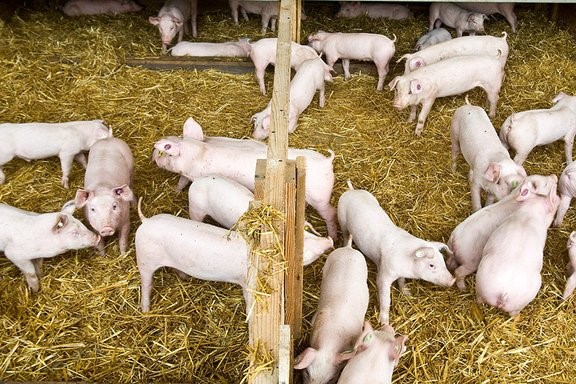Study investigated possible zoonotic properties of influenza viruses on European swine farms.
July 28, 2020

Pig farms are important reservoirs for an increasing number of various influenza viruses, some of which can spread to people and may have pre-pandemic potential, according to a comprehensive study carried out by the Friedrich-Loeffler-Institut (FLI) and the Freiburg University Hospital in Germany.
Together with other partners, and supported by CEVA Tiergesundheit GmbH, FLI said the study shows that this also applies to the situation in Europe. For this purpose, more than 18,000 individual samples from almost 2,500 pig-keeping companies with respiratory diseases in pigs in Europe were examined. This study was published July 27 in Cell Host & Microbe.
According to FLI, pigs are ideal for the multiplication and re-sorting of influenza viruses that come from humans, pigs or birds. The causative agent of the last human flu pandemic, influenza A (H1N1) in 2009, entered the pig populations of Europe in 2009 and, according to the findings of the study, is of outstanding importance for the rapidly growing repertoire of new virus variants in pigs, FLI said.
Pig farms in Germany and a further 16 European countries were examined. Influenza virus infections were found all year-round in more than half of the farms examined, the institute reported. While four influenza virus lines with different geographical distributions dominate the pig populations in Europe, new virus variants are emerging.
One focus of the study was to investigate possible zoonotic properties of these viruses, i.e., their possible transmission potential to humans, FLI said. The detailed analysis of the similarities to human viruses and the transmission properties in ferrets — an animal model for human influenza — showed that some variants have zoonotic potential feature, the announcement said.
Other viruses proved to be resistant to an important component of human virus defense, FLI said.
“Some of the swine influenza viruses have already overcome an important barrier to transmission to humans. This increases the risk significantly," Dr. Martin Schwemmle from the Freiburg University Hospital said.
Current knowledge of the infection situation, improved control strategies and the optimization of vaccines for pigs against influenza viruses can make a significant contribution to increased animal welfare and reduce economic losses in pig production, FLI said. At the same time, a decrease in influenza viruses in pig herds would reduce the risk of human exposure to potentially zoonotic influenza viruses from this reservoir.
"The much-touted 'One Health-Gedanke' currently here could be promising in practical projects for the mutual benefit of humans and animals to implement," said Dr. Timm Harder from FLI as well as being the head of the World Organization for Animal Health, the U.N. Food & Agriculture Organization and national reference laboratories for avian influenza.
You May Also Like
.png?width=300&auto=webp&quality=80&disable=upscale)


